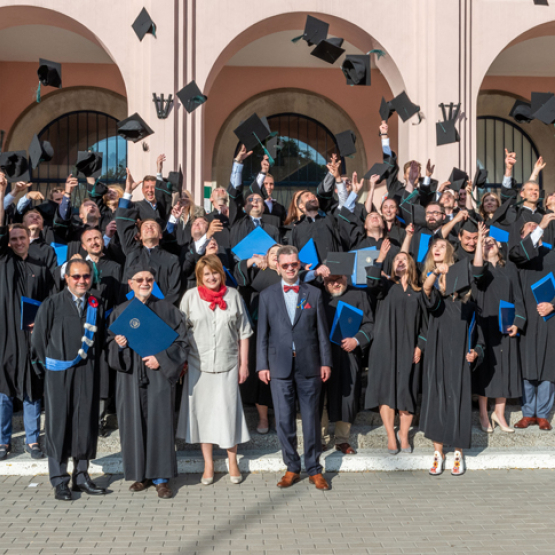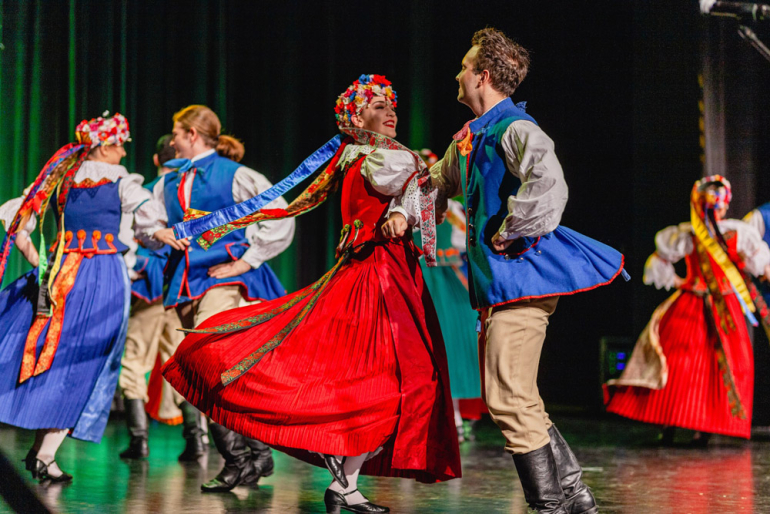
A conversation with Anna Markowska, manager and content supervisor of the Folk Song and Dance Ensemble of the SGH Warsaw School of Economics on the occasion of its 20th anniversary.
BEGINNINGS
My adventure with the ensemble began, in fact, right from the moment of its inception, i.e. in 2004, when the members of the Wisła Folk Song and Dance Ensemble, founded on the initiative of Referat Wschód of Związek Harcerstwa Rzeczpospolitej (Eastern Section of the Scouting Association of the Republic) and the Warsaw Branch of the Wspólnota Polska Association, approached Marek Rocki, the then Rector of the SGH Warsaw School of Economics. Paradoxically, at that time I was working in the Information Technology Centre as an IT specialist, but music was always present in my life. We were all musical at home, I had danced in folk ensembles since kindergarten, and already as a student in the Bartek ensemble derived from the Folk Song and Dance Ensemble of the Warsaw University of Technology. When the rector asked me what I thought about the idea of a folk ensemble at our university, I replied: Sir, I’ve been looking forward to it!, says Anna Markowska.
In 2004, prof. Marek Rocki, the Rector of the SGH Warsaw School of Economics, approved the students’ proposal to create a folk ensemble that would draw on the achievements of the Wisła Folk Song and Dance Ensemble. The ensemble was founded by Anna Skalska Toho and Jan Tatsuhiko Makólski Toho - choreographers and instructors descended from Mazowsze National Folk Song and Dance Ensemble.
Such were the beginnings of the SGH Folk Song and Dance Ensemble. Anna Markowska has been cooperating with the group almost from the very beginning - as she herself underlines - out of great love for folklore, music and dance, and has been part of it for 20 years.
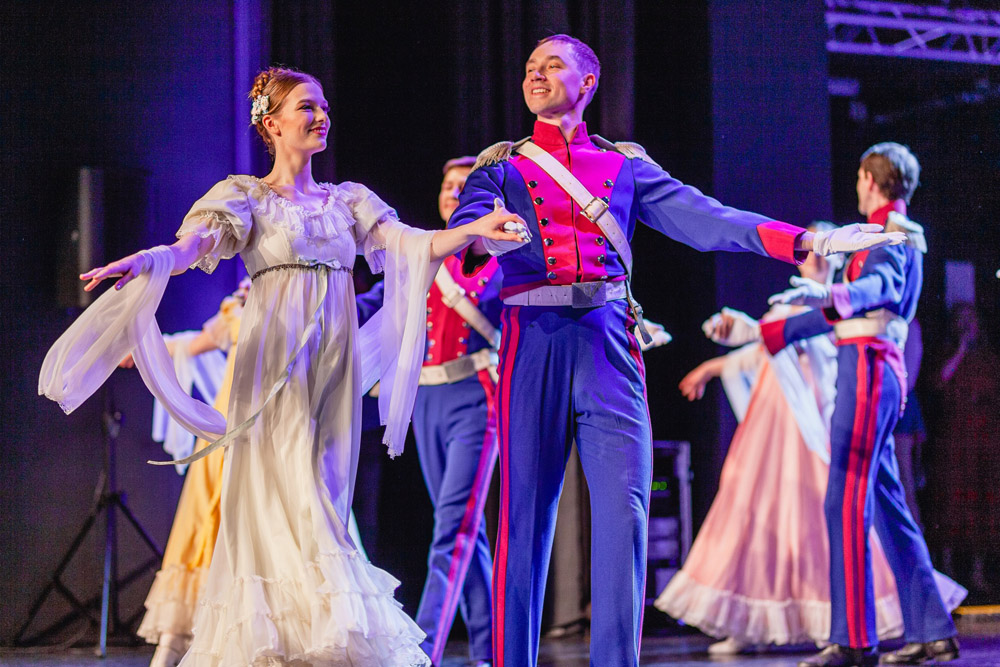
MEMBERS
Many of the young people who come to study with us from all over the country have already had contact with folk dance. They have this “germ” in them and want to continue practising. They share a passion for dancing, singing and acting. Here they have found a family, as Anna Markowska points out.
It is estimated that in the 20 years of its activity so far, the ensemble has had around 300 members.
We are a student organisation, and all the work is done by the members of the ensemble. Every year we elect a new board. The students have a lot of coursework, they do charity work, however they still want to be involved in the existence of the ensemble, maintain its continuity and they have done so for 20 years, says the manager.
The ensemble works primarily for the benefit and promotion of the university, and for this work it receives great support from the authorities of the university, as well as funds for its activities that student organisations are entitled to. It participates in all university events, performing at most international conferences held at SGH, as well as at galas, concerts and other celebrations.
We demonstrate our Polish identity. At the end of each performance, we always dance the polonaise with our guests. This dance was inscribed on UNESCO’s Representative List of the Intangible Cultural Heritage of Humanity in December 2023. That moment marks a great event for Polish culture and tradition. It came as a result of a joint effort by the managers of all folk ensembles in Poland, who postulated just such an entry, as Anna Markowska observes.
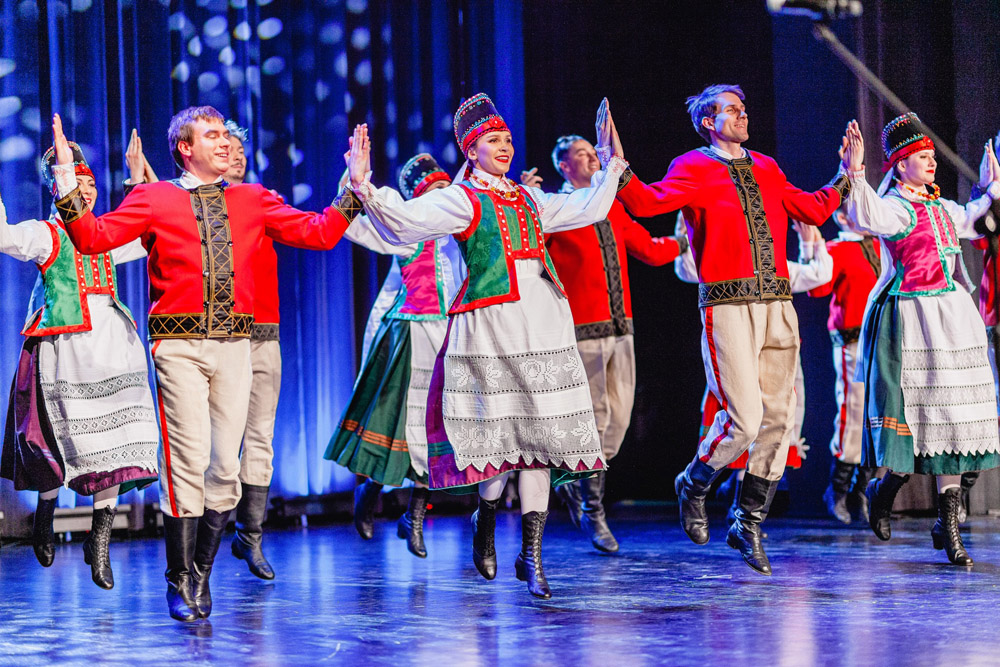
FOREIGN TOURS
The SGH Folk Song and Dance Ensemble does not limit itself to performances at the university and university-related celebrations.
The ensemble has performed in numerous concerts, both at home and at international folklore festivals in many different countries including, among others, Turkey, Morocco, Kazakhstan, Spain, Holland, Bulgaria, Croatia, Greece, Japan, Armenia, Ukraine, Lithuania, the Azores in Portugal, Hungary and Sardinia in Italy. The ensemble also performed at Days of Polish Culture in Saint Petersburg and Arkhangelsk in Siberia, in Macedonia, Montenegro, Sicily, and this year we have an invitation to Colombia.
As a member of the Polish section of the International Council of Organizations of Folklore Festivals and Folk Art (CIOFF), for the second time we received a certificate, which opened the way for us to perform at prestigious festivals abroad. To obtain the certificate (certificates are obtained for a maximum period of five years), it is necessary to take part in an audition of one and a half hours. A panel of jurors - the Committee of Experts from CIOFF - is then invited to evaluate the performance in terms of dance, vocals and music. Each time our performances receive very high marks. This year, one of the comments we received was that the band played the oberek too fast (laughs). We usually receive best marks for the so-called image, which is how the ensemble presents itself as a whole: neat costumes, interesting choreography, beautiful make-up, says Anna Markowska.
In 2016, the SGH Folk Song and Dance Ensemble travelled to Japan at the invitation of the Japanese Folklore Federation in Kobe on the occasion of the latter’s 60th anniversary.
It was undoubtedly the adventure of a lifetime, a ten-day tour of Japan’s largest cities - Kobe, Kyoto, Tokyo, Kanagawa, Ibaragi, Sendai, Miyagi. At the opening ceremony of the jubilee in Kobe, two and a half thousand Japanese danced the polonaise with us on the sports stadium. It was July and the weather was beautiful, but at the same time it was also demanding, typical holiday weather, so a double challenge for our dancers, but even that did not prevent them from giving a professional performance at such an important event. The Japanese were delighted, she emphasises.
At the ‘Happy Planet’ International Folk Festival in Armenia in July 2017, the SGH Folk Song and Dance Ensemble won the Grand Prix in the ‘Dance’ category, first place in the ‘16+ Dance Group’ category, and claimed an overall victory in the ‘Best Folk Ensemble’ category.
The fact that rehearsals take place three times a week, the spring and autumn trips to vocal and dance workshops, and the costs associated with the trips do not discourage students from enrolling in the ensemble, in fact it is quite the opposite. The students take care of their costumes themselves, they do minor repairs, they learn make-up, and before each concert they are given instructions by the costume supervisors on how to prepare for the performance from what underwear should be worn under the costume to the colour of powder and lipstick - all of which is included in the specially compiled “ensemble member’s companion for a concert”. During our conversation, Anna Markowska often reiterates that the ensemble is first and foremost a family, and that the members relate to each other with courtesy and respect. Perhaps the clearest manifestation of the ensemble as a family is the fact that there are already more than 20 married couples among the members of the ensemble who actually first met in rehearsals.
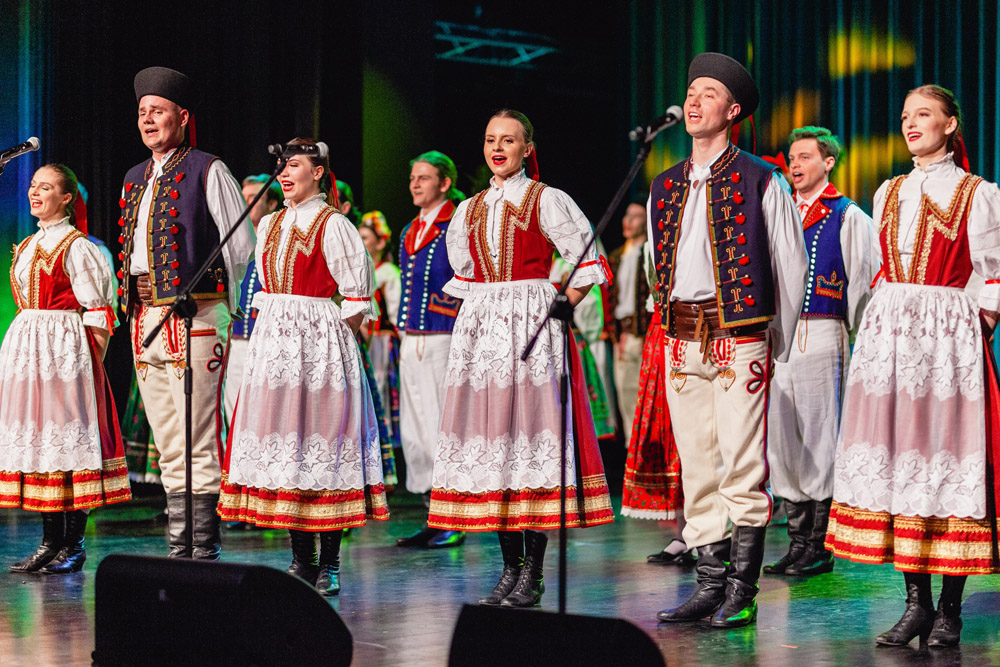
THE COVID-19 PANDEMIC CHALLENGE
Contrary to what might be expected, the COVID-19 pandemic did not disrupt the continuity of the ensemble.
We never stopped training even for a moment. We connected for classes online via Zoom. Adam Kłudzynski, a choreographer working with the ensemble, prepared videos of ballet warm-ups. Jan Makólski-Toho ran the classes from his home. Everyone felt highly motivated, as Anna Markowska emphasises.
During the pandemic, we participated in the International Folklore Festival in Brazil which took place online. All the ensembles from around the world that were invited to the festival sent in their recordings, which were then rated by a panel of jurors. We sent in the recordings of obereks from the ensemble’s 15th anniversary concert. We received a certificate of participation and congratulations. Oberek is our speciality.
At the moment, the ensemble comprises more than 40 members. Even though the pandemic did bring about changes as to the activities and line-up of the ensemble, the core has remained the same: Anna Skalska Toho, Jan Makólski-Toho and Anna Markowska continue working with the ensemble.
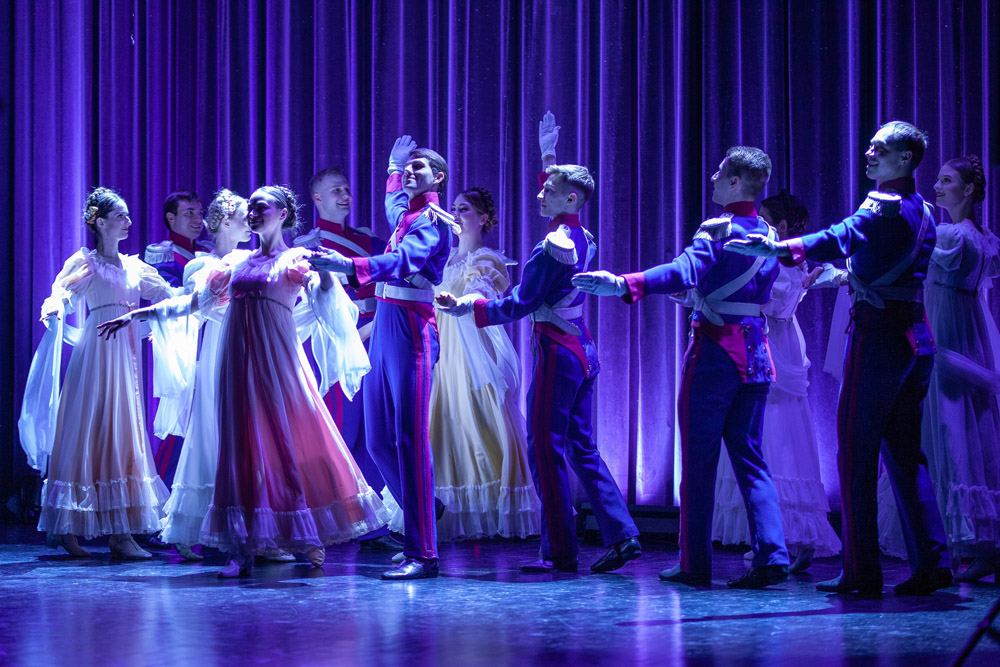
UPCOMING PERFORMANCES
The nearest upcoming performance of the SGH Folk Song and Dance Ensemble will take place on 24 April 2024 during a conference organised by SGH, followed by the spring vocal and dance workshops, preparations for the SGH Festival, performances at the next meeting of The Conference of Rectors of Academic Schools in Poland (CRASP) and intensive preparations for the demanding festival in Colombia.
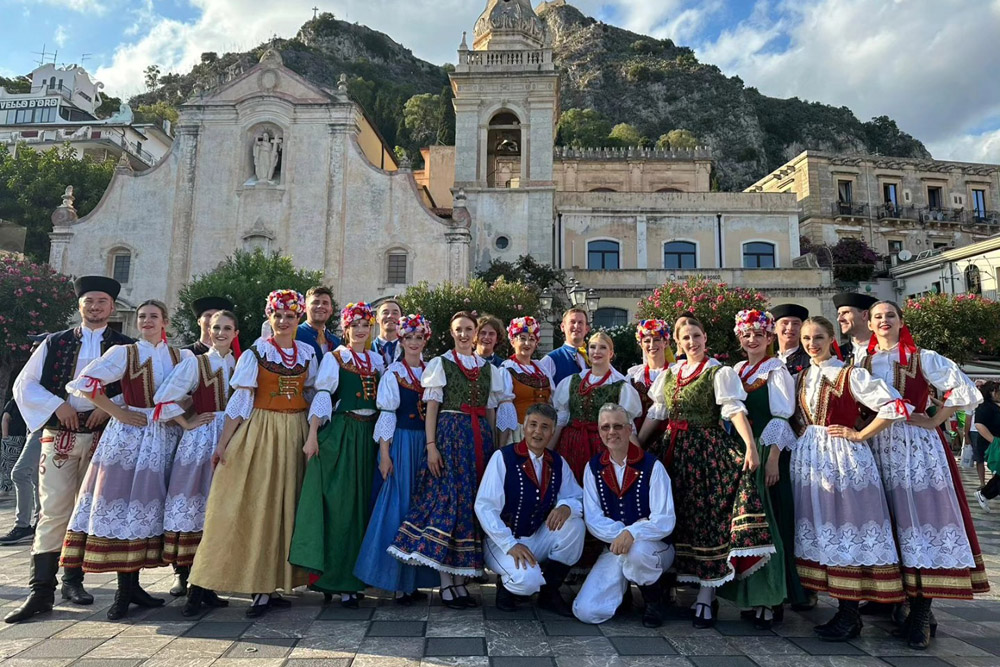
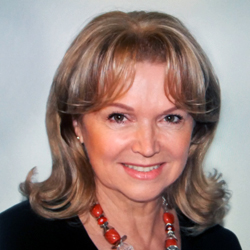
Anna Markowska - a graduate of the Faculty of Management and Marketing at the SGH Warsaw School of Economics and Postgraduate Studies for Cultural Managers also at SGH. She was brought up in a patriotic home, where she developed respect for work, love of music and people. She graduated from the 3-year Music School of the Stanisław Moniuszko Warsaw Music Society in the faculty of song and solo singing, also taking private lessons with professors – soloists of the Grand Theatre – National Opera in Warsaw.
My dream was to study art – vocal studies at the Music Academy (now the Chopin University of Music) in Warsaw, but things turned out differently. I took my education in a completely different, scientific direction, which was a surprise also to myself, she admits.
ANNA SYDORCZAK, Press Unit, SGH Rector’s Office



